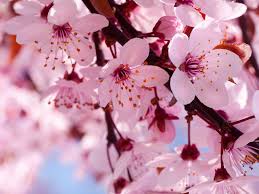blossom
英 [ˈblɒs.əm]
美 [ˈblɑː.səm]
- vi. 开花;兴旺;发展成
- n. 花;开花期;兴旺期;花开的状态
- n. (Blossom)人名;(英)布洛瑟姆
使用频率:

记忆方法
将“blossom”联想为“花苞绽放”。想象一朵花苞在阳光和雨露的滋润下,逐渐“blossom”开成绚烂的花朵,这样的动态变化有助于记忆这个单词的含义。
以上内容由AI生成, 仅供参考和借鉴
中文词源
blossom 开花
来自bloom, 开花。
英语词源
- blossom
-
blossom: [OE] Blossom probably comes ultimately from an Indo-European base *bhlōs-, which was also the source of Latin flōs, from which English gets flower. It seems reasonable to suppose, in view of the semantic connections, that this *bhlōs- was an extended form of *bhlō-, from which English gets blade, bloom, and the now archaic verb blow ‘come into flower’.
=> blade, bloom, blow, flower - blossom (n.)
- c. 1200, from Old English blostm, blostma "blossom, flower, fruit," from Proto-Germanic *blo-s- (cognates: Middle Low German blosom, Dutch bloesem, German Blust), from PIE *bhlow-, extended form of *bhel- (3) "to thrive, bloom" (see folio). This is the native word, now largely superseded by bloom (n.1) and flower (n.).
- blossom (v.)
- late 14c., from Old English blostmian, from blostma "blossom, flower" (see blossom (n.)). Figurative use from late 14c. Related: Blossomed; blossoming.
权威例句
- 1. The cherry blossom came out early in Washington this year.
- 今年华盛顿的樱花开得很早。
- 2. Why do some people take longer than others to blossom?
- 为什么有的人比他人大器晚成?
- 3. The trees are in blossom .
- 树上鲜花盛开。
- 4. The blossom on the trees looks lovely in springtime.
- 春天树上的花很漂亮.
- 5. Hopefully the tree will produce some blossom next year.
- 这棵树有望在明年开花.
